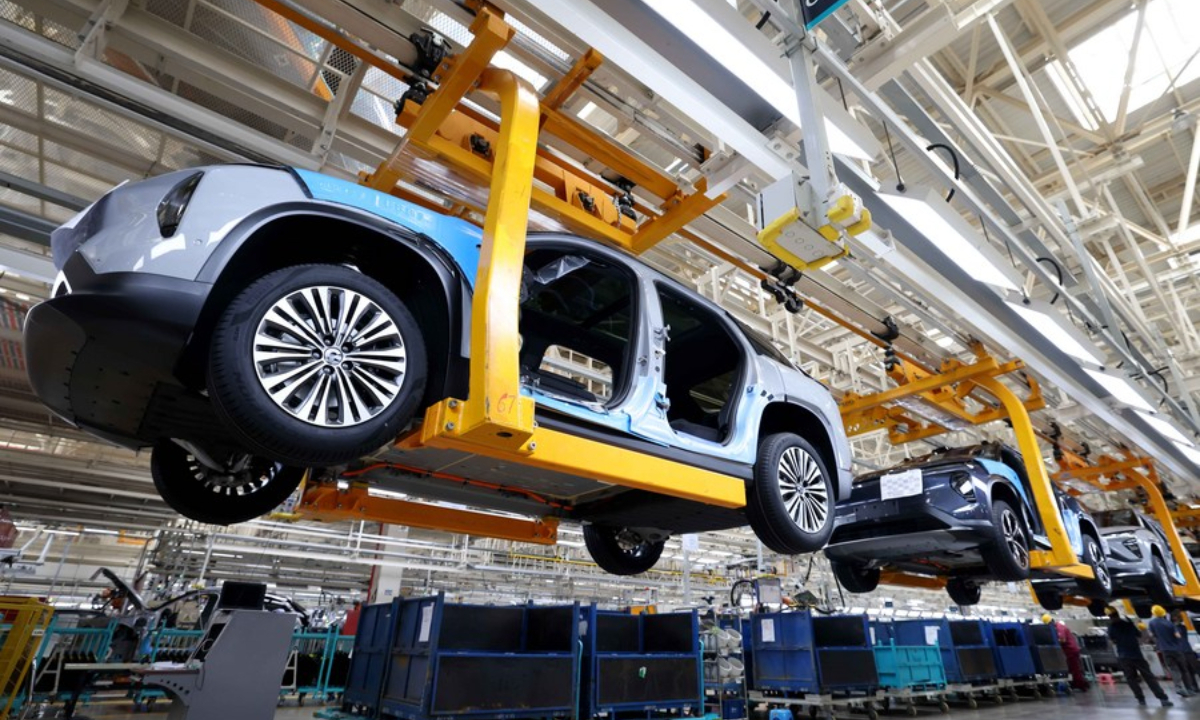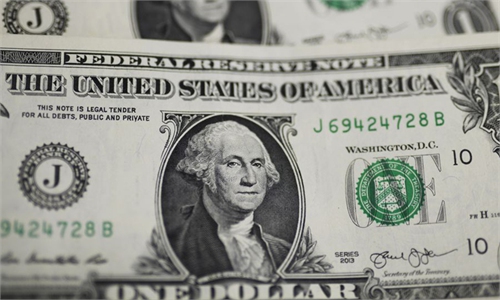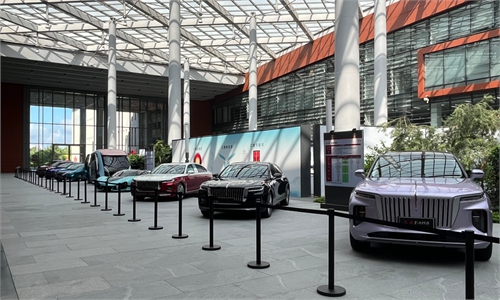
Photo taken on Aug 28, 2022, shows a complete vehicle production line at a new energy vehicle factory in Hefei, east China's Anhui Province. Photo:Xinhua
Some US senators on Wednesday expressed concerns about China's "control of energy infrastructure," leading them to push for a waiver in the "Buy America" requirements related to electric vehicle (EV) charging stations. This stands in stark contrast with Chinese carmakers, which are actively increasing global cooperation.
Protectionism by the US in the new-energy vehicle (NEV) sector, driven by a desire to contain China's technological rise, will hinder technological progress by the US and limit its ability to compete on a global scale, experts said.
Four Republican US senators are seeking to reverse a Biden administration decision to waive "Buy America" requirements for government-funded EV charging stations, Reuters reported.
Senators including Marco Rubio of Florida said the waiver of US content requirements for steel, iron and construction materials would result in US taxpayers subsidizing Chinese products.
"It hurts American companies and empowers foreign adversaries, like China, to control our energy infrastructure," Rubio said.
The waiver rule axed more stringent requirements and pushed certain deadlines back months. Under the 2021 bipartisan infrastructure law, federal infrastructure projects like EV chargers must obtain at least 55 percent of construction materials, including iron and steel, from domestic sources and be totally manufactured in the US.
The rules adopted in February don't take force until July 2024.
As China is at the forefront of global EV manufacturing, such as chargers and batteries, the move is widely seen as protectionism to push China out of the EV industrial chain in the US through subsidies.
If the US wants to use trade protectionism to stifle China's advantage in NEVs and ensure its own advantage, it will face higher production costs and lower competitiveness, experts said.
Charging station suppliers in the US have a significant gap compared with those in China, facing issues such as obsolete technology, a late start and high costs, Zhang Xiang, visiting professor at Huanghe S&T University, told the Global Times on Thursday.
"Protectionism will only hinder the development of the NEV sector in the US, leading to safety problems and a poorer user experience," Zhang said.
While the US pursues protectionism and zero-sum thinking, Chinese companies are accelerating their technological upgrades through international cooperation, demonstrating an open mindset.
German carmaker Volkswagen Group said on Wednesday that it was strengthening its position in the Chinese car market with cooperation between the VW brand and Chinese electric carmaker XPENG and between Audi and SAIC, one of China's largest carmakers.
As part of the close and long-term strategic cooperation, the Volkswagen Group is to invest approximately $700 million in the Chinese manufacturer of intelligent electric cars, acquiring a 4.99 percent stake in XPENG.
The decision of foreign companies to collaborate with Chinese counterparts is their recognition of China's economic potential and new-energy capabilities. It is also win-win collaboration for both parties, experts said.
Volkswagen is set to gain from XPENG's knowledge in new energy, software and intelligent connectivity, where Volkswagen lacks expertise. The partnership will enable Volkswagen to swiftly introduce NEVs and advanced models to the Chinese market, Zhang said.
For XPENG, Volkswagen's investment will provide new funding opportunities and support its expanding into the European market, Zhang said.
This collaboration will foster more cooperation between Western car manufacturers and Chinese EV producers, he predicted.
Global Times


